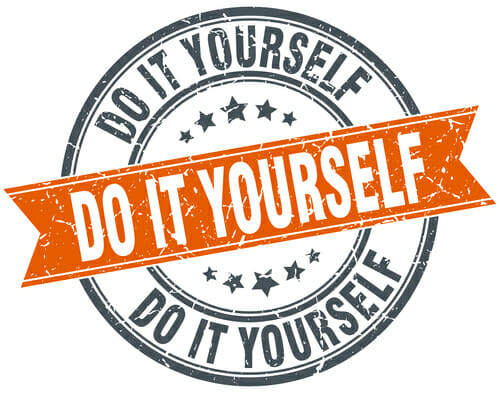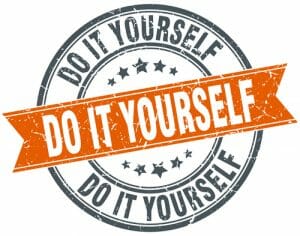{Read in 6 minutes} More and more these days, people are drafting and signing legal documents they prepare themselves with the assistance of an automated software program or an online tool. Very often, people will ask me, “Tom, why should I come in and pay an attorney like you to write my Will when I can get it done online for a fraction of the price?”
That is a very fair question. The answer is because when you retain a lawyer to write a Will, you are not paying for the physical documents or a legal form; you are paying for the legal advice that I (or another attorney) give you in preparing your estate plan and ensuring that it is fully tailored to all of your wishes.
Some people think that is a good reason to write me a check. Others do not. For those that do not and choose to do it themselves (or Do It Yourself), is it possible to have a computer create a perfectly valid Will? The answer is yes, absolutely, so long as the directions are followed.
That’s always something that makes me smile. It reminds me of a sign that I saw very recently in the Probate Department of one of the Surrogate’s Courts in New York City. It said, “If all else fails, read the directions.” Why do I bring this up here? Because a lot of times, I have seen some very thoughtfully prepared and well written DIY Wills that were incredibly clear about what a Deceased wanted to happen to his or her assets upon his or her death. However, they had a problem with the execution of their Will, which either prevented the Court from admitting it to probate, or caused thousands of dollars in litigation expenses because things did not go well.
So I thought it would be helpful here to create a checklist for those readers who decide that they are going to go the DIY route. What is it that they need to do, if they are New Yorkers, to ensure that they have properly executed their Wills?
Signatures: It’s very important that the person who writes the Will (called the Testator) signs the Will at the end of the document. Most forms provide a line on which the Testator will sign his or her name. Why do I mention it here? Believe it or not, sometimes Testators forget to sign their names. When that occurs, no Court will admit the Will to probate. Other times, the Testator will sign in the middle of the document instead of at the end. What happens then? If the Court does admit it to probate, it will only admit the language that appears above the Testator’s signature to probate — everything else is invalid. If the language above the signature does not fully distribute the Testator’s Estate, the remaining assets will be distributed in accordance with the laws of intestacy. So make sure that (1) you’ve signed the document and that (2) you’ve signed in the right place!
Witnesses: In order for a New York Will to be valid, the Testator must ask two people to serve as witnesses, and the witnesses should observe him sign the Will — and the witnesses themselves must sign the Will in the Testator’s presence and in the presence of the other witness. It all has to happen at the same time.
Where do things go off the rails here? Well, first, sometimes the client does not have any witnesses. They simply prepare a form, either themselves or through a document assembly service, and they sign it – but they never have the document witnessed. Guess what? No Court is going to admit this Will to probate regardless of how clear the Testator’s intentions are; a Will like this would simply fail to meet the statutory requirements. Another place where people go off the rails is if they choose the wrong people to serve as witnesses. Who can be a witness in New York State? Anyone who is over the age of 18 years and who is disinterested in the Will. What does it mean to be disinterested? It means that the witness is not a beneficiary. If the witness is a beneficiary, their status as a witness could void their bequest. For example:
I wish to leave $50,000 to my good friend, Stacey. I also ask her to serve as a witness to the Will. In that situation, the Court will likely probate the Will. However, Stacey’s status as a witness will likely prevent her from receiving the $50,000 bequest.
Declaration/Publication: New York State has a statute that requires a Testator to publish (identify) the document to the witnesses as his or her Last Will and Testament. How does this normally happen? The Testator simply says, “This document is my Last Will and Testament and I would like the two of you to sign as witnesses.” However, many times DIY Wills fall short on this requirement.
I was recently involved in a contest of a DIY Will someone wrote. She had left almost everything to charitable organizations. In reading the document, which she had typed on an old-school typewriter, it was clear that she had put a lot of thought into the distribution of her assets. How did she get it witnessed? She brought it to her local bank and asked the bank staff to serve as witnesses. Did they? Yes. But when we deposed them in the Will contest, they all stated that the Testator never identified the document to them as her Will. She simply presented the signature page, identified the Testator’s signature, and asked them to sign as witnesses. With this testimony, the Testator failed to meet the statutory requirement for signing a Will.
Therefore, it is exceedingly important that those people who choose to go the DIY route follow all of the instructions. (Make sure that you read them!!! They’re really there to help you.) Some people prefer to have an attorney write their Will simply because they know that the supervising attorney is pretty good at ensuring compliance with all of the requirements (in fact, New York Courts presume that a Testator duly executed a Will if the Testator signed it in the presence of a licensed New York attorney). However, if you do have a DIY Will, take it out of the drawer and look at it and compare it with the notes here in this article. Have you followed all the directions? Is it going to be clear when someone offers it for probate? (If not, I suggest you either do it again on your own, or come in and speak to a Trusts and Estates lawyer who can assist you.)
Contact me to get started.


